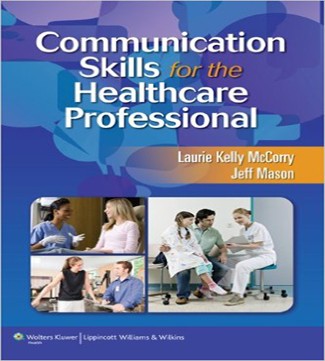Communication Skills for the Healthcare Professional 1st Edition McCorry Mason Test Bank
$38.00
Communication Skills for the Healthcare Professional 1st Edition McCorry Mason Test Bank Download
- Description
- Reviews (0)
Description
You will receive this product immediate after placing the order
ISBN-10: 1582558140
ISBN-13: 9781582558141 978-1582558141
1. __________________ is the use of spoken words and sounds to transfer a message from one party to another.
A) Nonverbal communication
B) Verbal communication
C) Written communication
D) Mass communication
2. __________________ is an authoritative and judgmental tone, the tone we use to give orders, exert leadership, or pass judgment.
A) The Overtone
B) The Directive Tone
C) The Expressive Tone
D) The Halftone
3. __________________ is a spontaneous, emotional, and uninhibited tone.
A) The Monotone
B) The Directive Tone
C) The Expressive Tone
D) The Problem-Solving Tone
4. __________________ is a rational, objective, and unbiased tone, the tone we use to indicate to the listener that we are using the analytical portion of our brains.
A) The Problem-Solving Tone
B) The Expressive Tone
C) The Sarcastic Tone
D) The Directive Tone
5. __________________ is to use your own words to repeat what someone else has said.
A) To Quote
B) To use the Expressive Tone
C) To Paraphrase
D) To Minimize
6. Which of the following is not an important reason for paraphrasing what a patient says to the HCP?
A) To test the message for the HCP
B) To test the message for the patient
C) To build rapport
D) To keep the patient entertained during a long office visit
7. To show empathy to the patient is to ___________________________.
A) Know what is best for the patient
B) Show that you also have felt pain
C) To show that you feel what the patient is feeling
D) To show that you feel sorry for the patient
8. ____________________ questions lead to the kinds of answers that HCPs will want to paraphrase – that is, longer, more detailed and emotional answers.
A) Closed
B) Open-ended
C) Prying
D) Multiple Choice
9. ____________________ questions lead to short and focused answers, frequently just a “yes” or “no.”
A) Closed
B) Open-ended
C) Multiple Choice
D) Rhetorical
10. _____________________ questions provide the patient with alternative options from which to choose.
A) Rhetorical
B) Moot
C) Open-ended
D) Multiple Choice
11. True or False? 95% of communication is verbal.
A) True
B) False
12. True or False? When the HCP does not have a clear sense of what they want to say, the patient can be a good source of help.
A) True
B) False
13. True or False? The HCP should speak in grammatically correct sentences.
A) True
B) False
14. True or False? The HCP should generally use the problem-solving tone when speaking to patients.
A) True
B) False
15. True or False? The HCP should use the expressive tone with their supervisor to show that they may have common interests in how to spend free time.
A) True
B) False
16. True or False? A supervisor uses the directive tone with a staff member to indicate there the staff member should follow directions.
A) True
B) False
17. True or False? An HCP should speak in a monotone without emphasis so that the patient will not really know what the HCP is thinking?
A) True
B) False
18. True or False? An HCP should use small talk to find out if they and the patient have interests in common.
A) True
B) False
19. True or False? An HCP should use medical jargon whenever possible so that the patient will be impressed and believe the care they are receiving is good.
A) True
B) False
20. True or False? An HCP should never use slang with a patient.
A) True
B) False
21. True or False? Empathy and sympathy really mean the same thing.
A) True
B) False
22. True or False? Using slang is a good way to show that you understand the patient, especially if they are from a different ethnic group from you.
A) True
B) False
23. True or False? It is important to talk to the patient and not at them as a way to show respect.
A) True
B) False
24. True or False? Good paraphrasing skills are essential to being an effective communicator.
A) True
B) False
25. True or False? Paraphrasing helps the patient to know that the HCP has correctly understood.
A) True
B) False
26. True or False? Using commentary is a good way to let the patient know what your personal opinion of them is.
A) True
B) False
27. True or False? By asking open-ended questions, the HCP can help the patient provide longer, more detailed answers, the kind of answers that are good for paraphrasing.
A) True
B) False
28. True or False? Closed-ended questions have that name because they are helpful in closing or ending the patient encounter.
A) True
B) False
29. True or False? To feel what the patient feels, to the point of walking in the patient’s shoes, is a good definition of empathy in a therapeutic situation.
A) True
B) False
30. True or False? Interrupting the patient is good idea if the patient speaks in a loud and annoying voice.
A) True
B) False
31. True or False? You should always use the patient’s name when greeting them as a sign of respect and an indication of the importance you attach to them.
A) True
B) False
32. True or False? If you think you know what’s best for the patient, it is okay to give them advice, even if they haven’t asked for it.
A) True
B) False
33. True or False? If the patient doesn’t have much to say, it is okay to talk about yourself to fill the time of the appointment.
A) True
B) False
34. True or False? Even if the patient has not told you how they really feel, it is a good idea to tell them how you think they feel.
A) True
B) False
35. True or False? The tone you should use most often with the patient is the problem-solving tone.
A) True
B) False
36. The tone we use when we tell jokes, express our feelings, or complain is _____________.
Be the first to review “Communication Skills for the Healthcare Professional 1st Edition McCorry Mason Test Bank”
You must be logged in to post a review.














Reviews
There are no reviews yet.